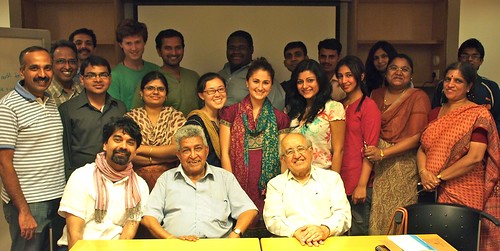By Sam Susanin
Below Sam reflects on a session with one of our partner organizations in India. Center for Social Initiative and Management (CSIM) runs a program similar to Global SE for professionals.
The GSE team attended our last CSIM session in which the founder, Mr P N Devarajan, spoke to us along with other CSIM students, interested in social entrepreneurship. Not surprisingly, many of the CSIM students there seemed to have extremely good jobs at Honeywell, Samsung, and other corporate companies. I say “not surprisingly,” because it has been a common theme throughout many successful NGOs that we have visited, that the founder had previously worked for theses types of companies.
Before Mr. Devarajan spoke, Professor Moledina opened the discussion explaining what Global Social Entrepreneurship was and how is was distinguishable from Social Entrepreneurship. Throughout the lecture he turned to the four of us (Erika, Sarah, Kipaya, & me) for our interpretation and definition of GSE and how it differs from SE. Kipaya, who was the only one of the four of us that has participated in local social entrepreneurship gave an insightful explanation. “GSE is certainly about the identification of a social problem and providing a meaningful solution (which is a pretty standard definition for SE) but global takes it a step further. A global social entrepreneur must be able to understand the eco-system he/she is in and tailor their response to that eco-system, as a solution in one eco-system may not work in another one.” It seemed that once Kipaya had said this, the other Indian students in the room began to take what we were doing much more seriously and with greater curiosity.
I have to say (and I think the rest of the GSE team will agree with me) it was a cool and fulfilling experience to be collaborating with fifteen other CSIM Indian students, many of whom have gotten a graduate degree and have high paying jobs in the IT, corporate, or other sectors in Bangalore. I attribute this to the high level of respect and prestige the GSE program at Wooster has garnished in its short two years of sending students to Bangalore. Like Kipaya stated, it is the understanding of “eco-systems,” that distinguishes GSE from other SE programs. During the seminar in the spring, Professor Moledina not only spent time on the principles of SE, but spent a lot of time on Indian culture and etiquette. While it did not seem that important at the time, looking back, having the better understanding of the Indian culture or “eco-system,” allowed me to be a better social entrepreneur during my time in Bangalore. Having this understanding also gave me the unique opportunity to interact with some of India’s best and brightest minds as a rising junior undergraduate. Talk about a unique program!






I love your article, I have been into the line of business for many years and recently I took a daring step to go beyond the way I used to do work before. We started with managing people and their needs first, rather than considering maximizing our profits. We have seen a massive growth in our business compared to my previous business venture which gave us a relatively slow results.